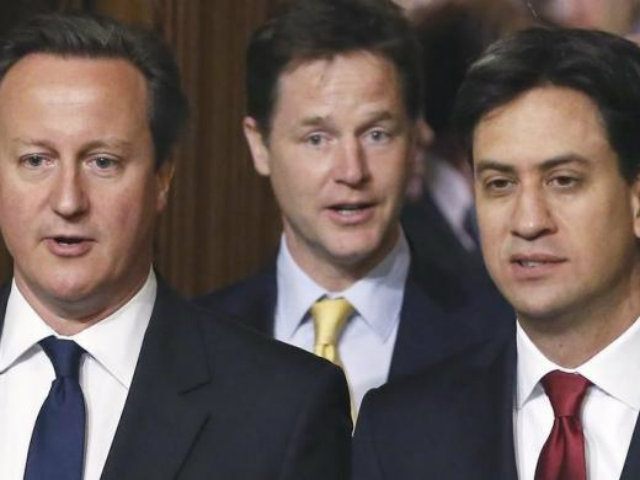It doesn’t really feel like it, but in just a few months’ time David Cameron could well have retired from politics. Or, we could be saying goodbye to Ed Miliband forever. Despite the predictions of anarchy, this coalition government has given us five years of relative political stability. But what chance does each party leader have of remaining in their posts in a year from now? A look at the possible permutations of the months ahead doesn’t bode well for anyone.
Most pundits agree predicting a winner at this election is a mug’s game. The bookies are playing safe too, with Labour and the Tories both close to even money in the seats market. It is therefore only fair to give Cameron a 50% chance of still being Prime Minister on May 8th. That said, his overall chances of staying as Tory leader after the election are lower than half, because of the possibility of him being removed even in the event of him being in a position to form a government. Why? Firstly, there won’t be a Tory majority.
Grant Shapps says Tory MPs will be given a vote on any potential coalition, with the Liberal Democrats or whomever else. If Cameron was to propose another coalition and lose that vote, he would face a leadership challenge and probably lose. Alternatively, if he chose to form a minority government, as he hinted was his preference last year, Cameron could well soon lose a vote of confidence and be forced to call an election. The coin toss with Ed Miliband and the possibility of losing despite ‘winning’ mean Cameron’s chances of still being PM in a year’s time are below half.
If Cameron has a 50-50 chance of being PM immediately after the election, then so too does Miliband. But he also has a less than evens chance of remaining as Labour leader going forward when you include the possible pitfalls of a Miliband premiership. Labour, too, are almost certainly not going to win a majority. That means either a coalition or some form of confidence and supply government with the Scottish National Party – likely the third largest party in terms of seats – or the Lib Dems.
There has been much talk north of the border of the possibility of Alex Salmond joining forces with Prime Minister Miliband. If Nick Clegg has been the poodle of this Tory-Lib Dem coalition, Salmond would be the tail wagging the dog in a Labour-SNP partnership. Considering the mutineers in his own party, how long would an Ed-led coalition or confidence and supply arrangement last before someone in his Shadow Cabinet challenged his authority?
In yet another indication of the health of our democracy, Nick Clegg arguably has a better chance of remaining as party leader despite his unparalleled unpopularity in the polls. There are several possible permutations that result in him keeping his job. The Tories could be the largest party, and seek to form Coalition 2.0. Clegg would remain as party leader and Deputy PM. The Tories could be the largest party and seek to run a minority government relying on the Lib Dems for confidence and supply. That scenario would not last long if the Lib Dems ousted Clegg and replaced him with the more left-wing Vince Cable or Tim Farron, so – if it was to work – Clegg would have to stay.
What about if Labour are the largest party? Clegg says he would go into coalition with either party, the man of principle he is. There is real enmity between Clegg and the Labour leadership, but if the numbers made him kingmaker that could soon be forgotten. Clegg still has a less than 50 percent chance of being the leader of his party in a year’s time, but oddly perhaps a slightly better chance than either Cameron or Miliband.
Given the robust position of UKIP in the polls and the incredible performance of the party at the European elections last year, it is another electoral peculiarity that Nigel Farage’s position is under greater threat than his rivals. Polls by Survation and Lord Ashcroft in South Thanet, where Farage is running, have put the Tories in first place. In the last year there have been polls showing Labour, the Tories and UKIP in the lead in the seat. It is a three-way fight which Farage is by no means guaranteed to win. He remains the favourite with the bookies, and will likely surge in the coming months, but still he faces the very real possibility of defeat. Failure this time round would almost certainly mean Farage standing down as UKIP leader. If he doesn’t win here, he never will, and he will be out.
Safest of the lot: the Green leader Natalie Bennett. Her party has enjoyed a remarkable resurgence under her leadership, now polling as high as 11 percent. They will still probably only win one seat in May, though as a share of the vote should poll considerably better than the 1 percent they managed in 2010.Last week the Greens released their list of spokespeople for the election. Bennett and former leader Caroline Lucas aside, there was not a recognisable name among them. Theoretically the job should be Bennett’s for the foreseeable future, only an internal assassination – something the Greens are always capable of – could change that.

COMMENTS
Please let us know if you're having issues with commenting.